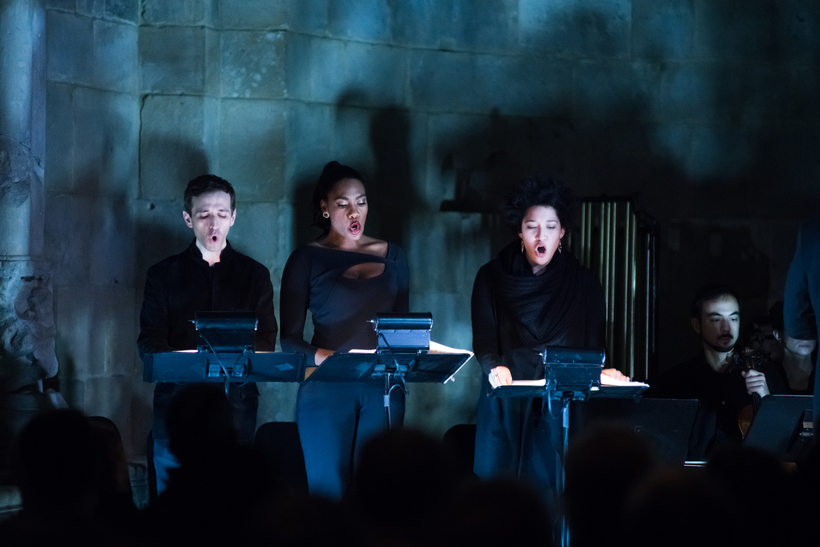Though often treated as such, Handel’s Messiah is not a Christmas oratorio. Nor is it an Easter oratorio, for that matter. The libretto traces an arc from Old Testament prophecy to a vision of Christ in glory; the Nativity, Passion, and Resurrection are stations along the way. Yet when John Adams undertook a Nativity oratorio on the cusp of the millennium, Messiah was the precedent he looked back to.
Not without differences, however. Whereas Messiah is set to texts taken exclusively from the Bible, the collage of English, Spanish, and Latin texts for El Niño, assembled by the composer’s frequent collaborator Peter Sellars, draws on secular as well as sacred sources. Kent Nagano led the premiere at the Théâtre du Châtelet in Paris on December 15, 2000, with Dawn Upshaw, Lorraine Hunt Lieberson, and Willard White in the principal roles. This spring, a comparably distinguished trio of artists from the current generation—Julia Bullock, J’nai Bridges, and Davone Tines—step out in a big-box theatrical realization by Lileana Blain-Cruz at the Metropolitan Opera (April 23 to May 17), conducted by Marin Alsop.

For a preview that is visually austere but spiritually rich, check out Nativity Reconsidered: “El Niño,” filmed live in the Fuentidueña Chapel at the Met Cloisters on December 21, 2018. Conceived by Bullock while she was an artist in residence at the Metropolitan Museum of Art, the performance preserves roughly half of the Adams score, omitting, among other things, the adult and children’s choruses and an otherworldly trio of countertenors. The selections are Bullock’s, and the musical arrangements—which reduce a 45-piece orchestra to six instruments in the violin family, guitar, flute, oboe, bassoon, percussion, and piano—are by Preben Antonsen, chosen by Adams.
“I’ve never thought of this current presentation as a chamber music reduction of the original,” Bullock wrote at the time of the premiere, “but rather a distilled rendering. It is something different, as it must be.”
The predominant mood is introspective, beginning with Bullock’s quietly hypnotic solo in which the expectant Mary stands as the archetype for all women on the brink of motherhood. The lordly bass baritone Davone Tines injects drama in a stuttering but tremendous outburst set to text familiar from Messiah (“I will shake the heavens…”). The most affecting moments come in the vignette of a palm tree that miraculously bows down to supply Mary and the Holy Family with fruit and fresh water on their flight into Egypt.
The vocalists could hardly be bettered. Bullock, who studied with Dawn Upshaw, has inherited her teacher’s mantle as a soprano without borders, singular in her sensitivity, honesty, and stylistic reach. Bridges cuts a poised figure of regal grace, singing in amber tones. Tines contributes prophetic authority. The fourth in the quartet is Anthony Roth Costanzo, whose sinewy countertenor blends magically with the soprano and mezzo. Christian Reif conducts with seraphic concentration.
El Niño is available for streaming on YouTube and other platforms
Matthew Gurewitsch writes about opera and classical music for AIR MAIL. He lives in Hawaii

